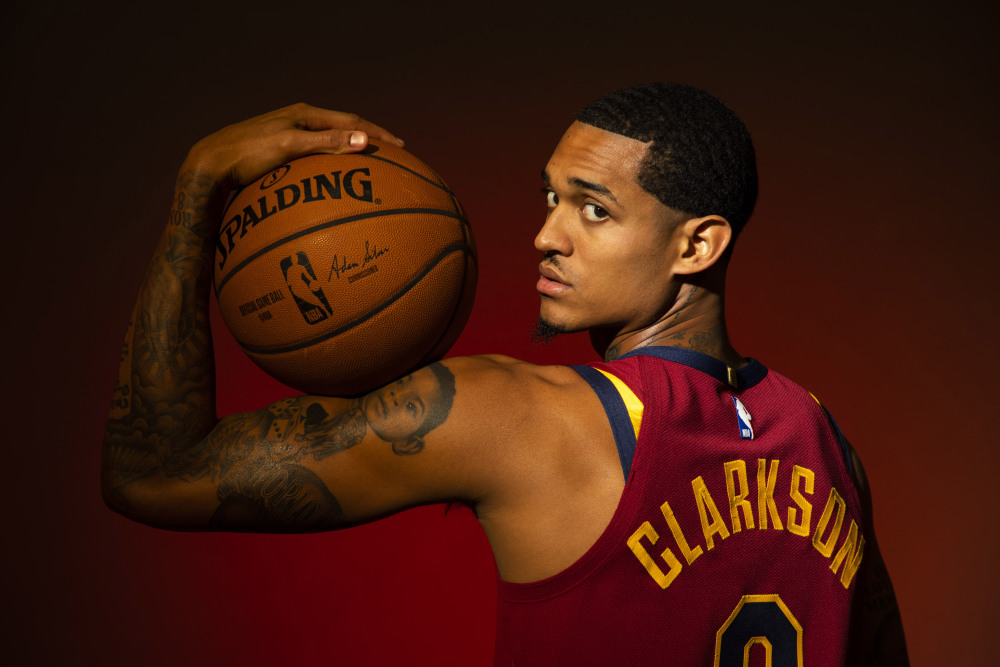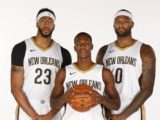
Time To Move On
2019-07-23In the age of analytics in the NBA, we occasionally see a large discrepancy between a player’s traditional statistics and how they are rated by more advanced metrics. This is much more common with the rank and file of the league than it is among superstars. LeBron James is amazing by any and every standard of measurement. Still, there have been notable players over the years (I’m thinking of you, Carmelo Anthony, DeMar DeRozan, and Andrew Wiggins) who been rated much worse by advanced metrics than they have traditional basketball statistics.
If there’s one member of the Cleveland Cavaliers who shows the contrast between traditional basketball statistics and modern day analytics, it’s Jordan Clarkson. A player who averages 14.7 points, 2.7 assists, and 3.2 rebounds for his career while being able to create for himself and (somewhat) for his teammates seems like a valuable piece who would be well-paid for his contributions. Indeed, Clarkson is well-compensated, as he’ll earn just over $13.4 million this upcoming season in the final year of a four-year $50 million deal he signed in 2016.
https://www.youtube.com/watch?v=2_cfxwVblkA
Yet, according to many advanced metrics, Clarkson is roughly a replacement-level player and nothing more. In fact, over the past four seasons, Clarkson has accumulated a VORP of exactly 0.0. Other analytic measurements have been equally tough on the Cavaliers’ sixth man. Five Thirty-Eight’s CARMELO NBA Player Projections predict Clarkson to be worth roughly -0.2 wins below replacement level over each of the next seven seasons. ESPN’s Real Plus-Minus metric was especially hard on Clarkson, as his -2.93 rating was 79th among 99 players identified as point guards, and 443rd out of 514 players who saw action in the NBA this season. The main problem was his -4.11 ranking in Defensive Real Plus-Minus, which 97th out of 99 point guards and 511th overall. For frame of reference, the only players who rated worse on defense than Clarkson were Collin Sexton, Trae Young, and Kevin Knox. All of those players were rookies who played heavy minutes and large roles for their teams, so the poor defense wasn’t much of a shock. For a veteran in his fifth season, better should be expected of Clarkson. While any of these measurements could be argued against, the fact that Clarkson rates poorly in all of them shows that there are some real flaws in his game.
Of course, when one watches Clarkson on a nightly basis like Cavalier fans do, what the analytics say isn’t surprising at all. He’s a poor defender both on and off the ball. While Clarkson can create for others, he rarely focuses on anyone’s scoring but his own. Because of this, Clarkson does a better job of staying within his team’s offense when he is moved off the ball, and someone like Matthew Dellavedova takes the reigns at point guard. While he is one of the highest scoring bench players in the NBA, he does so with below average efficiency, both inside and from beyond the arc, and doesn’t get to the free throw line quite as much as one would expect. Because of this, Clarkson’s overall scoring efficiency is below league average, and for every night that his hot hand kept the Cavaliers in games, there were just as many when he shot them out it. That isn’t to say he’s a useless player, he certainly isn’t. Being a ball-dominant microwave scorer off the bench can work for some teams, but for the Cavaliers, it could be a disaster.
The biggest problem with Clarkson is that his style of play can have a direct and extremely negative effect on arguably the two most important players in the Cavaliers’ rebuild, Collin Sexton and Darius Garland. While Sexton’s statistics weren’t much different with and without Clarkson on the floor, that was because he was the only other high-scoring guard on the team. That isn’t Dellavedova’s style, and injuries seem to have cost Brandon Knight the ability to be a ball-dominant scorer. In fact, with Kevin Love having missed the majority of the season, Sexton and Clarkson were the only real scorers the Cavaliers had last season especially after they traded Rodney Hood and Alec Burks. With just the two of them as primary scorers, there were plenty of touches and shots to go around.
Now, with Garland joining Sexton, the franchise is being built around a pair of small guards who are solid scorers, but need work on their passing and defense. They need to have the ball in their hands as much as is realistically possible so that they can learn to play together and off of one another. When you have players like that as your core, it’s important to surround them with other players who can compliment them. The Portland Trailblazers are the obvious example. Built around the combination of Damian Lillard and C.J. McCollum, general manager Neil Olshey had typically surrounded them with large wings such as Moe Harkless and Al-Farouq Aminu, shooters like Seth Curry and Allen Crabbe, and big men who can score inside and control the boards such as Hassan Whiteside or Jusuf Nurkic. Even now, with the personnel changes they’ve made this summer, the Blazers still compliment their stars with three-point shooting wings such as Hood and Kent Bazemore and a rangy forward in Nassir Little. The size and shooting at other positions spaces the floor for Lillard and McCollum and also helps cover for their defensive issues.
Some will point to the fact that the Trailblazers have also had a ball handling wing such as Evan Turner or Mario Hezonja on their roster. While that is true, Clarkson isn’t really that type of player. In fact, Cedi Osman is a far closer approximation to either of those players. To be blunt, Clarkson is another score-first combo guard who will take valuable possessions away from Sexton and Garland, the score-first combo guards who the Cavaliers have a greater investment in. Even if he’s the better scorer now, giving Clarkson the ball instead of Sexton or Garland isn’t what’s best for the Cavaliers in the long term. With Knight, Dellavedova, Osman, and Kevin Porter Jr. all capable of backing up the guard spots, Clarkson isn’t needed on this rebuilding team. Simply playing him less doesn’t seem like a good option either. While Clarkson seems like a good teammate, fewer minutes and touches would undoubtedly frustrate him in his final season before hitting free agency. Those frustrations could cause problems that the Cavaliers simply don’t need during this stage of their rebuild.
There likely isn’t much of a market for Clarkson right now, but some team may be willing to swap another expiring deal with similar money for him. Would the Charlotte Hornets consider a trade of Michael Kidd-Gilchrist for Clarkson? Both players have seemingly come to the end of the line with their respective teams, and the Hornets could use use Clarkson’s shot creation, while the Cavaliers could use a defensive wing like Kidd-Gilchrist. He’s a similar player to Harkless and Aminu, even if he’s not the shooter they are. Both players would have a better chance of being long-term pieces for their new teams versus their current ones.
In the right situation, Jordan Clarkson’s scoring abilities and aggressive mentality can help a lot of teams. But with the Cavaliers investing so much of their future in Darius Garland and Collin Sexton, it seems like it’s time for both he and the team to move on.



REAT GAME BY BIEBER——WILL BE INTERESTING TO SEE WHAT TRIBE DOES WITH BAUERS / WOULD HAVE TO BE A TRADE IN OUR FAVOR ( HUGE ) TO PULL THE TRIGGER
Wow Bieber tossed a one hit shut out.
Christmas in July:
https://twitter.com/richarddeitsch/status/1154126530760577024
PLAYERS ONLY BABY!!
As long as they don’t cancel Kevin Garnett’s Area 21 I’ll be ok
Thank gawd! The only one’s who weren’t terrible were Billups and the WNBA players.
Good riddance to KG.
Nice piece, Mike. Unfortunately, Clarkson will play a lot at the 1,2, and 3. Clarkson is 6-5 and the team lacks wing size. Ultimately, this is probably moot, because this is a “development” season. Still, there is value in building Jordan’s rep in the hopes the Cavs can flip him as an expiring to a team that needs a bench scorer at the deadline. I don’t love his game, but I’d challenge him to be a contributor on both ends for the Cavs and tell him that the Cavs will try to ship him to someone who can showcase him… Read more »
I don’t understand signing another guard
https://www.google.com/amp/s/www.cbssports.com/fantasy/basketball/news/cavaliers-j-p-macura-signs-deal-with-cavs/amp/
He’s not really a guard, more like an undersized wing. He’s definitely not defending any NBA guards with quickness off the dribble. I watched him play at Xavier. He’s more like a poor man’s Caris Lavert… similar numbers to him in college.
Is this a camp contact, a 2 way, or an actual roster spot?
it’s a partially guaranteed contract, with the ability to convert to a two-way IIRC.
Yes it counts as a roster spot.
I continue to think there is value in a system where playing time is earned, not given. It helps team chemistry. It motivates players to improve. It is necessary for accountability.
If PT is decided before the season based on some rebuilding plan, the vets have no reason to care & the rookies are not held accountable for poor play.
Plus, throwing a guy to the wolves can destroy his confidence. And damage the coach with the players.
Garland, Sexton, Windler, and Porter should have to earn their time. So should Clarkson.
I am sure Porter jr and Windler will have to, or would have to if didn’t we have so few guys that are actually wings. Sort of makes playing them necessary by default. Sexton has earned his time. And Garland will play since he is a top 5 pick. That is how the nba works. Young guys need game experience as well. Whether they should start or how much they should play is another matter. Clarkson is bad enough to be benched. He has earned that. He definitely shouldn’t play over Knight or Delly as a backup. But he will… Read more »
Over Knight? Knight is awful.
So is Clarkson. Inefficient scoring means nothing and can be a detriment to the offense if the player provides literally nothing else. I feel like Knight worked much better with Sexton. And therefore would work much better with Garland as well. Honestly I don’t want either playing over Delly.
Never been that high on Clarkson. This article only reinforces my opinion of him. Maybe we can dish him at the deadline as an expiring.
https://twitter.com/StarLord1989/status/1153695876168257537?s=20
Oof. That must hurt. I hope they told him they were just planning on doing it so they could rework his new contract…
Honestly I don’t want Clarkson to play at all this season. Just will hamper the development of the young guys and cause us to lose. He has no value outside his contract. No reason to try to increase his value since it won’t happen. Teams already know what he is. Just take back a bad contract. In fact none of our expirings, save TT, have any value outside exchanging their expirings for bad contracts. Even he doesn’t have that much value. Cavs will only get positive assets back if we take negative ones back. So no point in trying to… Read more »
Huh didn’t know this. Thought player tampering was legal, not just impossible to punish.
“It is technically against league rules for players to tamper with each other and work together on transactions before the official opening of free agency.”
https://www.espn.com/nba/story/_/id/27244254/nba-looking-free-agency-process-sources-say?platform=amp
CALL ME THE “ETERNAL OPTIMIST “——-IS THERE ANY HOPE HE– ( CLARCKSON )– WILL IMPROVE / CHANGE UNDER BEILEIN / NEW COACHING STAFF ?
If JR could change, then there’s always a chance that Clarkson could change. It’s solely up to Clarkson. No contending team has a use for him.
He got a $50M contract but doing what he’s doing and for some players, that’s enough for them.
Good stuff. Clarkson definitely doesn’t have a place on this team. That being said, most available advance metrics seem unfairly tilted towards bigs. Unless a guard gets 7+ assists a game, they always look much worse than bigs in comparison. It gets proven every year, but when the defenses tighten up in the playoffs, being able to hit jump shots is the most important skill in the game. I don’t know how you measure “is good at hitting difficult shots”, but it seems to me guards get unfairly punished for having to take these types of shots.
I’ve seen Clarkson in the playoffs. That can’t be used as a defense for him.
Not defending Clarkson necessarily. Just saying I think advance stats have an unfair tilt towards players who don’t have to take difficult shots. Clarkson is bad.
I think it has more to do with defensive value. There is built in positional weighting in DRPM at least. Regardless, small guards (pgs) still aren’t as impactful even today as wings. Not sure elite pgs can get it done as the lead guys against competition with elite wings in the finals. They just will never be as impactful. Size matters.
I don’t count 2015 because of the injuries.
The list of teams who won a title and their best player was a PG is pretty short:
1) Isiah Thomas Pistons
2) 2015 Warriors (Curry)
3) Later 80s Lakers (Magic)
4) Perhaps the 70s Knicks teams (Walt Frazier)
5) Maybe 1 year of the Spurs (Parker)
6) 2004 Pistons (Billups)
Maybe a couple others, but you may have to go back to 40s NBL (Bill McDermott) to get there. Bill Davies & Rochester Royals in the 40s-50s?
I don’t even count the lakers since Magic is 6’9″. Pistons were a weird group in that they sort of had four guys who about as equally important.
His value is his expiring deal. Taking back a worse deal is his value and the only way to get picks for him. Unfortunately, next summer’s weak FA class means expirings are less valuable.
Pretty much agree with all of this. I wish they had gotten rid of him before the draft, but like you said, really not much of a market for him. I don’t see one opening up, though that Charlotte deal might be good. I assume they’ll need players that help them stay towards the bottom of the standings.
I think they’ll be a bottom three team regardless.